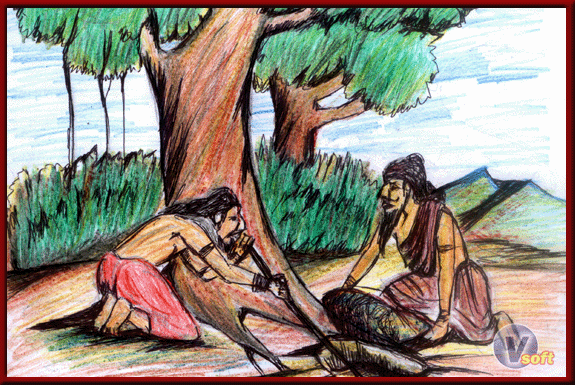240. The Bodhisatta And The Treasure-Pots

Once upon a time when Brahmadatta was reigning in Benares, the Bodhisatta became his minister and temporal and spiritual adviser. The king of Benares went against the king of Kosala with a large army, and coming to Savatthi, after a battle entered the city and took the king prisoner. Now the king of Kosala had a son, prince Chatta by name. He made his escape in disguise, and went to Takkasila, where he acquired the three Vedas and the eighteen liberal arts. Then he left Takkasila, and while still studying the practical uses of science he arrived at a certain border village. In a wood near this five hundred ascetics lived in huts of leaves. The price approached them, and with the idea of learning something from them, he became an ascetic, and so acquired whatsoever knowledge they had to impart. By and bye he became the leader of that band of disciples.
One day he addressed his company of holy men and asked them, saying, “Sirs, why do you not go to the central region?”
They said, “Sir! Wise men are living in the central region. They pose one with questions, call upon one to return thanks and to repeat a form of blessing, and reprove the incompetent. And therefore we are afraid to go there.”
He said, “Fear not! I will manage all this for you.”
They said, “Then we will go.” And all of them reached Benares. Now the king of Benares, having got all the kingdom of Kosala into his possession, set up royal officials as governors, and himself, having collected all their available treasure, returned with his spoil to Benares. And filling iron pots with it, he buried them in the royal garden, and then continued to live there. So these holy men spent the night in the king’s garden, and on the morning went into the city to beg alms, and came to the door of the palace. The king was so charmed with their deportment that he called them up and made them sit on the dais and gave them rice and cakes, and till it was their meal-time asked them such and such questions. Chatta won the king’s heart by answering his entire question, and at the close of the meal he offered up various forms of thanksgiving. The king was still more pleased, and exacting a promise from them he made them all stay in his garden.
Now Chatta knew a spell for bringing to light buried treasure, and while living there he thought, “Where can this fellow have put the money which belonged to my father?” So repeating the spell and looking about him he discovered that it was buried in the garden, and thinking that with this money he would recover his kingdom also, he addressed the ascetics and said, “Sirs, I am the son of the king of Kosala. When our kingdom was seized by the king of Benares, I escaped in disguise, and so far I have saved my life, But now I have got the property which belonged to my family. With this will I go and recover my kingdom. What will you do?”
“We too will go with you,” they replied.
He made some big leather sacks, and at night digging a hole in the ground he pulled out the treasure-pots, and putting the money into the sacks he had the pots filled with grass. Then he ordered the five hundred holy men and others as well to take the money, and fled to Savatthi. There he arrested all the king’s officers, and recovering his kingdom he restored the walls, watch-towers and other works, and having thus made the city impregnable against the attack of any hostile king, he took up his abode there. It was told to the king of Benares, “The ascetics have carried off the treasure from your garden and are fled.” He went to the garden and opening the pots found only grass in them. And by reason of his lost treasure great sorrow fell upon, him. Going to the city he wandered about murmuring. “Grass, grass,” and no one could assuage his grief. The Bodhisatta thought, “The king is in great trouble. He wanders to and fro, idly chattering. Except myself, no one has the power to drive away his sorrow. I will free him from his trouble.” So one day the Bodhisatta said to the king:
“Grass” is still thy constant cry;
Who did take thy grass away?
What thy need of it, or why
Does thou this word only say?
The king on hearing what he said, replied:
Chatta, holy man of fame,
As it happened this way came:
Him alone to blame I hold,
Substituting grass for gold.
The Bodhisatta, on hearing this, said:
Canny folk their rule should make,
“Little give and mickle take.”
What he took was all his own,
What he left was grass alone?
On hearing this the king said:
Virtue follows no such rules,
These are morals fit for fools.
Doubtful morals they must be,
Learning too is vanity.
While he thus blamed Chatta, the king by these words of the Bodhisatta was freed from his sorrow and ruled his kingdom righteously.
The Master here ended his lesson and identified the Birth: “At that time the knavish Brother was the great Chatta, and I myself was the wise minister.”


Leave a Reply